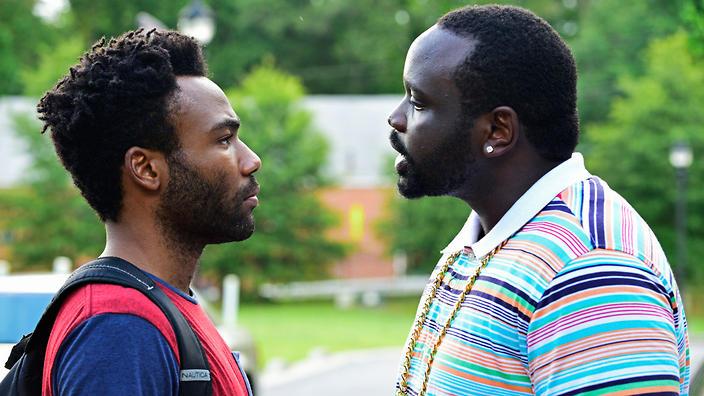First published on SBS, June 2017.
You can’t stop Zan. In “The Streisand Effect”, the fourth episode of Donald Glover’s hit series, Atlanta, the racially ambivalent social media star (Freddie Kuguru) has no qualms about being a living, breathing composite of the darkest corners of the internet if it means getting clicks, money, fame.
He’ll ask for a selfie outside the club to post on an Instagram account called @ZanLivesMatter. He’ll arrive on hoverboard and film your conversation for a Vine clip. He’ll try to sell you his customised beanies and drop the n-word liberally.
“Are you even black?” asks Paper Boi (Bryan Tyree Henry), whose transition from unknown drug dealer to rising rapper with a mixtape that’s gone viral is one of the show’s main arcs. That question — which both proscribes the notion of a universal black identity while grappling with the many shades and textures of blackness — may as well stand in for Atlanta’s aim itself.
As Brian Josephs points out in a September 2016 Spin article, Atlanta, a city where nearly 54 percent of the population is African-American and a Civil Rights capital whose history as a mecca for the black middle-class often rubs up against violence and poverty, is a rich setting, sure. He also suggests the city is also a symbol for the way African-Americans see themselves, something that Glover (a poster boy for the self-reflexive, insider-outsider codes of the internet age) and his all-black writing team wield to stunning effect.
Atlanta is equally sharp on the intersection between race and class. In “Juneteenth”, one of the best episodes of the season, Earn and Van (Zazie Beetz), the long-suffering mother of his daughter, attend a party thrown by a wealthy, mixed-race couple, Craig (Rick Holmes) and Monique (Cassandra Freeman). Craig tells Earn he needs to visit his motherland, Africa, while spouting Malcolm X quotes. That he’s the only white person that gets any screen time is telling. Atlantashows up this absurd need to project a quest for authenticity onto people of colour for the racist sham it truly is.
Atlanta is a defining example of a new kind of TV show, often conceived by and starring multiple people of colour, that is less interested in shallow notions of diversity and representation — the token approach that’s historically underpinned race on television (see: Gilmore Girls, Love, Stranger Things or anything made before 2010) — than in creating nuanced, hyper-specific worlds.
From Issa Rae’s Insecure (the dating exploits of a young, black woman in South Los Angeles) to Benjamin Law’s The Family Law (an Asian-Australian family living in Queensland) to Aziz Ansari’s Master of None (an Indian-American actor grappling with adulthood in New York City), these shows share a common mission. They mine the differences between people of colour rather than showing people of colour as different, affording them the depth and complexity only reserved for white characters in the process. They don’t depend on the white gaze — Toni Morrison’s idea that people of colour are always speaking to a white audience — for validation.
After surveying his cousin Navid (Harris Gani), who’s never tried pork, and his friend Tanvi (Lakshmi Sundarum), a Hindu who loves gangster rap, he decides to own his secular habits, although this means crushing his mother for whom embracing Islam is about holding onto the culture she left behind. Sure, the struggle between first-generation children and their immigrant parents is a familiar one. The idea that there’s no one way to be Indian (or Muslim or African-American or a rapper from Atlanta) in a culture that tells you otherwise is quietly radical, even though it shouldn’t be. We need more stories like this.
